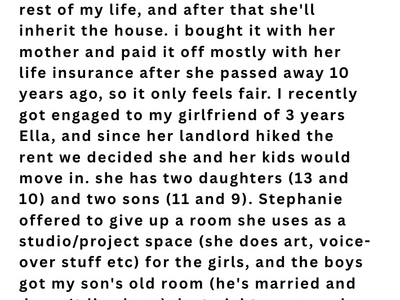I Baked a Cake for My Daughter’s 9th Birthday – My Little Girl Found It Destroyed on Her Celebration Day
The first sound that split the party like a dropped glass was Sophie’s scream. It came from the kitchen, sharp and small and full of something I could feel in my bones—pure, surprised grief. For a second the music and the laughter and the clink of paper plates stopped, like the house itself was listening. I was at the front doorway, half-dressed for the party, a string of deflated balloons in my hand, and I remember the world narrowing around that one note she let out.
Sophie was nine. She had the kind of face that made people slow down—wide eyes that held a permanent sort of wonder, a dusting of freckles across the bridge of her nose, a mouth that turned up at the corners even when she was uncertain. She left notes in odd places: under my pillow, folded into her sock drawer, tucked into the pages of library books. “I love you, Mommy,” they said in a careful childish scrawl, sometimes with hearts so uneven they looked like they’d been drawn by moonlight. She’d give away the last bite of her cookie to the dog, to a friend, to a stranger on the street if they seemed sad. She was soft, honest, and entirely unguarded.
I had promised her a cake “bigger than my head and prettier than a princess dress,” which was exactly the sort of promise she treasured. I had promised it without thinking how many hours it would take, and then I had spent those hours. Three sponge layers, each baked and cooled and coaxed into level complacency. I beat cream until my arms trembled and my muscles hummed, folded in vanilla until the kitchen smelled like warm mornings and new things. I tinted the frosting a pale pink, not the gaudy hot pink of cheap party store icing but a soft, blushing rose, and I piped tiny pearls and flower petals around the edges until my hand cramped. Each petal was placed with such silly ceremony—pinch, pipe, steady—and when I stepped back the cake looked like a thing that had grown from a wish.
James had noticed, of course. He always notices the small theatrics of my life. He is the sort of person who loves the messy parts of other people—the awkward attempts and the earnest failures—and makes them feel like miracles. When he first came into our lives, three years earlier, Sophie had been cautious. Divorce leaves little tremors in children; they test new people like bridges. But James didn’t bristle. He knelt instead. He told ridiculous knock-knock jokes that made Sophie howl, read the same picture book every night until the words got soft on his tongue, and spent whole evenings teaching her to pedal in a straight line. When she learned to ride, he ran beside her until his shirt was damp with sweat and his smile was all teeth and light. The day she called him “Dad” for the first time, the sound knocked something open inside him—he cried like a man who had been given a second chance at being brave.
We had talked about family until our voices frayed. We had talked about what it meant to be “ours.” For Sophie, still small enough that her knees banged when she climbed into bed, “ours” meant bedtime stories with two different accents, pancakes with syrup art, and a man who kissed the patched knee and pretended the bandage was a pirate flag. “Ours” was complicated in the way of real things—soft parts and jagged pieces—but it was real. It was also real in the way people can take it for granted. Love is not always fierce enough to defend itself until someone calls it out.
So when the scream tore through the house, the living room froze. Paper plates clattered. A child dropped a balloon and its sound ballooned into echoing silence. Sophie stood at the doorway of the kitchen, her small frame framed by baking mitts and a scattering of crumbs, and in the center of the table lay the cake I had made like a little shrine—smeared, flattened, buttercream trampled, the piped birthday message practically illegible. Someone had shoved their hands into it and left tracks of frosting as if a small storm had rolled across the table.
She sank to the floor like a puppet with its strings cut, a wet sound escaping her, and the sob that followed was something made of sudden, complete disappointment. “Who would ruin my birthday cake?” she asked, her voice small and raw.
Everyone turned at once. People pointed fingers in directions: across the room, at balloons, at an arm-chair. But my eyes found Helen the way a compass needle finds north. She sat in a chair away from everyone else, the afternoon light turning the silver in her hair to a cold halo. She had always been one for control, for the polite sort of smile that hides corners. She had the uncanny ability to make small slights feel very large, and she carried the sort of quiet judgment that settles on a room like dust.
Her lips curved into something that was not quite amusement. It was not the easy, indulgent smile grandparents often wore. It was something thinner. Anger with a glossy finish. My stomach dropped, not because I wanted it to, but because I had seen that look in her eyes before—when Sophie called across the table for more mashed potatoes, when she hugged James and didn’t look over to Helen with the proper scripted look of gratitude. That look had always hinted at a story that excluded Sophie.
I said her name like a question. I think my voice shook. “Helen,” I said, “did you do this?”
She let the question hang and folded her hands in her lap with the slow, theatrical patience of someone about to deliver a verdict. “Why would I bother myself with a cake?” she said, a flicker of mock surprise passing over her face. The words were clean and clipped, but they were a lie by how carefully she had practiced them.
Sophie peered up at her grandmother, eyes red-rimmed. “Why would you do this to me?” she whispered. The whisper felt like a plea for a reason that made sense. Children believe that bad things always have reasons you can name. Hunger. An accident. Bad weather. People—sometimes—they cannot name the sudden cruelty.
Helen’s mouth hardened. Her voice cooled. “Because you’re not really mine. You’re not even James’s real daughter. I’m tired of pretending.”
It felt like someone had struck the room with a dull instrument. Sound bounced off the walls in a way that made the air hurt. Sophie’s shoulders went up and then collapsed, sounds coming out of her that were wetter, more helpless. She pressed herself against me the way she used to when the thunderstorms rolled in: small, shaking, certain that shelter was a tangible thing you could cling to.
James’s face changed. Love will sometimes polish a stranger’s hurt into a weapon, and he bore that newly polished edge now: protective, immediate. He didn’t yell. He didn’t let the argument be anything softer than it had to be. He came in the doorway, and the set of his jaw made his profile look carved. He scanned the wrecked cake, then looked at Sophie, then at Helen. “Don’t you ever say that again,” he said, and the words did not have to be loud to be final. “Sophie is my daughter. She became mine the moment I chose to love her, and nothing will ever change that.”
Helen’s sneer tightened. “You’re blinded by sentiment. One day you’ll regret wasting your love on someone else’s child,” she said, venom cloaked in the thin plaid of propriety.
James folded his arms until the muscles in his forearms showed silver. “No,” he said, quietly at first, and then with more force. “The only regret I have is letting you near her this long. If you cannot accept Sophie, you are not welcome in our home—ever.”
I have seen people storm out of rooms in movies; I had never seen it in my life until that afternoon when Helen pushed herself up like a spring and left, the door slamming so hard it seemed to knock the air out of the house. For a breathless half-second afterward, there was no sound but the kind of small, rolling sobs that come from children when something huge has shifted. Sophie curled into me on the floor, and the party around us tried to pretend it was still a party. Tissue boxes appeared, whispers passed. Someone sang “Happy Birthday” because ritual is a net people throw over chaos in the hopes that it will hold.
James knelt in front of Sophie and took her hands between his. He looked at her like you look at something precious and easily breakable but impossible to replace. “Listen to me, sweetheart,” he said, and even in the way he said it—soft, patient, unblinking—there was a kind of promise. “You are my daughter. Always and forever. Nothing can ever change that. I love you more than anything.”
Her arms went around him, small and fierce, and she buried her face in his shirt like she was seeking refuge from a storm. For a moment, the wreckage around us receded. The balloons swooped again like bright birds, the children found songs with new mouths, and laughter—tentative at first—began to return like distant wind.
But that wasn’t where the story ended. James, after kissing the top of Sophie's head and wiping her tears gently with the back of his own hand, got up and left the house. He didn’t explain. He grabbed his keys like a man with a mission and the air huffed out of the room with a kind of calculated absence. People asked where he was going. I couldn’t answer because I didn’t know. I only knew the feeling in my chest tightened at the sight of him stepping out the door.
He was gone about half an hour. That time stretched and folded itself into the party like elastic. The kids ran in loops; adults resumed their conversations with the thin veneer of normalcy. I watched the doorway like a tide-watch, seeing him appear at last with an odd bundle in his hands: a bakery box tied with a ribbon and a string of balloons bobbing like small planets. He walked in like somebody bringing a small, bright truce.
He set the box on the table and opened it like a magician revealing the final card. Inside was a cake that looked like something Sophie had described in one of her night-time whispered wishes: a shining unicorn, piped sugar mane flowing in rainbow waves, glittering eyes, and on top, nine little candles. Sophie’s lips parted and the way her eyes widened felt like sunrise. There was a tiny, incandescent moment where the party paused to watch her breathe in, then blow out the candles with a slow, deliberate wish. She smiled again, an almost shocked, grateful thing that made her dimples look like sudden little caves.
“No one ruins your birthday,” James said, and there was an iron softness in his voice. He set the cake down like a new law, a quiet declaration that some things—love, belonging—would be defended.
That night, after the kids had left, plates stacked like small, obedient soldiers, and Sophie lay asleep with one of the unicorn’s plastic hooves clutched to her chest, James sat across from me at the kitchen table. The light over the table cast a pool that kept our hands in a halo, and he took mine and held it. His thumb rubbed small circles on the back of my hand the way someone speaks to a frightened animal to calm it.
“She’s ours,” he whispered. The statement was both simple and enormous. “Nothing Helen says will ever change that.”
I thought about all the ways people build family. There are the obvious ways—blood and shared genes, the family trees you can measure and trace. But there are other ways that are quieter, hands-on, stitched into dinners and late-night homework and damned stubborn defense when someone tries to fence you out. I have watched James through all manner of small domestic trials—bad haircuts, forgotten lunches, small rebellions that seemed like earthquakes to us—and his devotion has always been practical and fierce. He fixes things for Sophie that have nothing to do with hammers: he listens to the nonsense of her made-up plays, he learns to braid hair even though hatted with incompetence, and he shows up. Showing up is the kind of love that becomes scaffolding.
The next morning, there was a balance in the house that had not been there before, the way light seems different after a storm. The party had been salvaged, yes, but salvage carries the bones of what was lost. Sophie woke cheerful and cautious, as if joy needed permission now. She hugged me in the kitchen, thumb hooked into the edge of my pajama sleeve, and asked for pancakes. I made them with extra butter. She told me about the other kids, about the way one friend had given her a bracelet and another had painted her nails uneven but bright. She forgot the cake for stretches, and then she remembered again, and each time the memory flared, it was a small wound.
Helen did not call. She did not apologize. She sent an email later that day—short, frosty, and full of carefully curated estrangement—a note about not wanting to “complicate things” and that she would “step back” “for everyone’s sake.” The wording was precise, the intention obvious; she wanted distance. It was the kind of message that kept its edges sharp enough to cut. James read it and crumpled it into the trash like you throw away pieces of a map you no longer need. He told me, in the quiet between two bites of leftover pancake, that some people were incapable of expanding the word family past the contours their own fear drew. He said he felt sad for her but not sorry for the choices she had made.
We told the story of the cake less and less as days turned into a new pattern. Children’s memories are mercifully short, or at least they pivot quickly to lighter things—new school projects, a scraped knee that needs a plaster, a test they flew through. Sophie’s focus shifted; she earned a ribbon in her spelling contest, and she learned to swim a little better than she had the month before. Life accreted around the edges of the event and smoothed them. But there were times later when we would be walking in the grocery store and she would tug my sleeve and point to a display of cupcakes as if reminding herself that she had been loved enough to have a second cake.
People asked, sometimes in the weeks after, why Helen had done it. They wanted a reason that fit into a tidy box: jealousy, a bad day, too much wine, the stress of a funeral, something. There are always tidy boxes people hand each other like tissues. But I learned there is no single neat explanation for cruelty. Sometimes it is a slow pressure of small resentments, the kind that accumulate unnoticed until they are enormous and callous; sometimes it is a sharp thing that was there from the start and finally announced itself. Helen’s actions revealed not a momentary lapse but a persistence, a structural problem with how she saw us. She had expectations of what a family should look like—bloodlines neat and unbent—and Sophie did not fit. It was as ridiculous and as dangerous as that.
The more I thought about it, the more I realized how often love has to be defended by ordinary courage. You defend it with your voice and your decisions and the way you refuse to let someone else’s small, poisonous stories become your truth. There were times after that when we locked our door a little firmer and set boundaries with a clarity we had not known before. We told our guests, gently but firmly, that this house would not harbor cruel talk. We taught Sophie—gently, without turning it into a sermon—that words can hurt in ways you don’t always see, and that love is sometimes a matter of choosing people again and again.
One afternoon, months later, we sat on the floor and built a fort out of sheets and chairs. Sophie and I crawled inside with flashlights, and James slipped a bowl of popcorn between us like a ceremonial offering. She told us stories—wobbly little epics about a princess who discovered a map to the stars and a pirate who only stole from people who had too many coins. She interrupted herself to drop random facts—“Did you know a jellyfish can be older than a tree?”—and she danced with the kind of unselfconscious joy that makes grown-ups’ throats ache in the best way. We laughed until the popcorn rained down, and it felt like a small, private victory over everything that had tried to shape us into something smaller.
It’s easy to think that family is something given to you, an inventory you inherit. But the cake taught me otherwise. Family is work. It is choosing, and defending, and sometimes rebuilding out of the wreckage of someone else’s hurt. There are nights when I wake up because the house makes a noise and my first thought is a worry for Sophie—then a second thought that makes the worry curdle into an understanding: we are all right. There are other nights when I think of Helen and feel a strange, pitying sadness. People hurt other people in ways that make no sense until you see them as mirrors: she is reflecting her own fear, not our failure.
I have learned to be braver with the word mine. I say it now without apology when I sign a school form or make a doctor’s appointment or when I tuck Sophie in at night and James whispers jokes in a silly voice until she giggles herself to sleep. These small domestic acts are stitches. They are the slow, persistent mending of trust after it has been threatened. They are proof.
Sometime, in the quiet laundry room light, I will find Sophie’s small notes tucked into unexpected places. “I love you, Mommy,” one will say, sometimes adding “and Daddy” in letters that look a bit like they were drawn with a ruler. I fold them into a little drawer and reread them when the world seems too big. They are evidence of what we have made together: a life that is messy and generous and wholly ours.
Helen’s absence remains a hole that sometimes hurts. She is Sophie's grandmother by blood, and that fact does not vanish. But love is stronger than a family tree’s brittle branches. Love is who shows up, who steps in, who holds your hand when the world says you are not entitled to be held. Sophie learned it the hard way and the tender way: some people will try to take away your place, and some people will place you there again with a fierce, stubborn tenderness.
There are kindnesses that are small and workaday—rubbing a shoulder after a long day, offering the last biscuit—and there are the grand gestures people sometimes make that become stories. James’s decision to leave and come back with a second cake was both. It was small in its logistics—drive to a bakery, carry a box, light candles—but it contained a larger courage, the kind that says, with quiet insistence, that love will not be lectured out of existence. It was a demonstration for Sophie and for us: we will show up for you. We will not let you feel like debris.
I watch Sophie grow in ways that sometimes make me dizzy—her knees lengthen, her voice cracks in funny places, she learns to argue with a passion I recognize in myself. And I watch James carve out a shape of fatherhood that is robust and warm. We make our mistakes; we apologize and we try again. We are stubborn about the small, good things. We bake cakes that sometimes get ruined and then bake another one without complaint. We tell the people we love that they are loved, out loud and often, not because it is always romantic but because it matters.
On quiet nights, I think about that afternoon and how quickly ordinary joy can be interrupted and how relentlessly it can be restored. I think of the sound of Sophie’s scream and the later, softer sound of her sleeping breath. There is a kind of song in both. One is a sudden alarm bell, the other is a calm hymn of safety. We live in the space between those two sounds, making our way, choosing to stay.
And when I look at Sophie—hair messy from running, freckled nose proud, grin wide—I remember the ribbon of the bakery box and the way the candles tipped and melted like tiny suns. I remember how James folded his hand over mine at the kitchen table and promised. I remember that love can be a shield, a repair, an affirmation, a stubborn, everyday practice.
We learned, that year, how to be fierce and gentle at once. We learned that family is who goes to the trouble of loving you back. In the quiet that follows the noise, in the shine of a child’s sleeping face, that lesson hums like a small lamp: steadfast, warm, and always lit.






